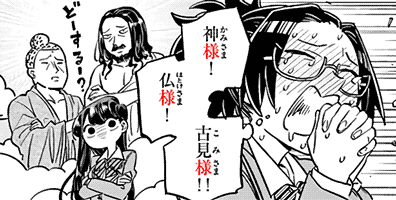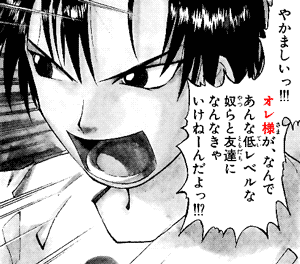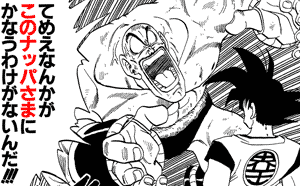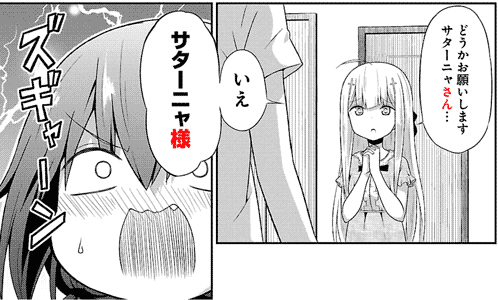In Japanese, ~sama ~様 after someone's name is a honorific suffix, used to refer to people with reverence and respect. It's also spelled ~さま,
In real life, it's used toward customers, clients. In anime, it's used by a slave or servant to refer to their master, lord, or lady. To refer to deities, and to other beings who are superior to the speaker.
Usage
The usage of the sama 様 suffix is rather complicated. Basically, it's supposed to refer to someone who's superior to you. Them being superior makes you inferior, so it's a humbling word.
Due to this superiority connotation, in practice, the sama 様 suffix is only used under certain circumstances.
Normally, to refer to someone respectfully, but as an equal, the san さん suffix is used instead. This san さん suffix is actually a corruption of the word sama 様.
A corruption of san さん is the chan ちゃん suffix, which is cutesy and generally used toward girls. There's a similar corruption for the sama 様 suffix: chama ちゃま, which is used only jokingly and in a few actual words.
Besides being attached to names, sama 様 is also found in a lot of words, in particular accompanied by the honorific prefixes o お or go ご. See: o__san お〇〇さん for a list.
Business
In the business world, sama 様 is normally attached to the names of clients, customers, or even employees of other companies.
It's not used to refer to people within the same company. The respect is toward people outside the company.
- okyakusama
お客様
Customer.
Family
Certain terms for family members in Japanese can get the sama 様 suffix attached to them.
- otousama
お父様
Father. - okaasama
お母様
Mother. - oniisama
お兄様
Older brother. - oneesama
お姉様
Older sister. - ojiisama
お祖父様
Grandfather. - obaasama
お祖母様
Grandmother.
Such words are all about people who are born before you. They're older than you, that's why sama 様 can be used.
You wouldn't refer to your "younger sister," imouto 妹, as imouto-sama, for example, because they're younger than you. When the word imouto-sama is used, it normally refers to the younger sister of other people, not your own.
Someone simply being older than you isn't enough to warrant sama 様 to be used. Again: the san さん suffix is normally used. A senior in an institution like a school can get the honorific title senpai 先輩 instead.
Masters
Slaves, servants, retainers, and so on, may refer to their master, lord, or lady with the suffix sama 様. After all, there's a very clear vertical hierarchy here.
- goshujinsama
ご主人様
A slave's master.
A retainer's lord.
The house's owner. Or owner of a establishment..
One's husband.
A summoned being's summoner.
A pet's owner. - ojousama
お嬢様
The daughter of the lord. Young lady.
A random rich girl. - bocchama
ぼっちゃま
The son of the lord. Young master.
A random rich boy.
Royalty
It's also the case that royalty is referred to using the sama 様 suffix.
- ousama
王様
King. - joousama
女王様
Queen. - oujosama
王女様
Princess. - ohimesama
お姫様
Princess. (too.) - oujisama
王子様
Prince.
Deities
The sama 様 suffix can also be used toward deities, gods, and those hierarchically closer to God and thus above the random unblessed peasant.
- shinpusama
神父様
Priest. Reverend father.
- kami-sama!
神様!
God! - hotoke-sama!
仏様!
Buddha! - Komi-sama!
古見様!
Komi-sama! - doo suruu?
どーするー?
[What should we] do?
Very Important People
In anime, it's often the case that a character is very important for some weird reason or another, and as such is revered by a lot of other characters. Such characters can end up getting the sama 様 suffix, too.
In particular, it's kind of a trope that referring to such character with sama 様 is the norm, and there will be a character that knows that very important person, but is completely unaware of that fact.
This develops into the unaware character finding it weird everybody calls the VIP with sama 様. And some of the VIP's followers correcting the unaware character, telling them: "you have to say VIP-sama, where's your respect?!"
Self-Importance
In rare cases, a pretentious characters addresses themselves with sama 様, like with ore-sama 俺様. Sometimes the demonstrative pronoun kono この is used, too. See: kono ore da この俺だ for reference.
- yakamashii'!!!
やかましいっ!!!
[You're] noisy!!!
[Stop annoying me!!!] - ore-sama ga, nande
anna tei-reberu na
yatsura to tomodachi ni
nan'nakya
ikeneendayo'!!?
オレ様が、なんであんな低レベルな奴らと友達になんなきゃいけねーんだよっ!!?
Why do I have to become friends with low-level guys like those!!?- tomodachi ni naru
友だちになる
To become friends.
- tomodachi ni naru
- Context: Nappa ナッパ informs Goku 悟空 of his opinion.
- temee nanka ga
kono Nappa-sama ni
kanau wake ga nai-n-da!!!
てめえなんかが このナッパさまに かなうわけがないんだ!!!
[There's no way someone like] you [can defeat] THIS NAPPA-SAMA!!!- kanau 叶う
"To rival" someone, as in, "can defeat," since someone unrivaled is undefeatable.
- kanau 叶う
Sarcasm
Sometimes, the sama 様 suffix is added to someone's named sarcastically, to imply they're acting like a king, or master, and mocking how they're giving orders around, or being pretentious, and that sort of holier-than-thou attitude.
It can also be used in many other dishonest forms, like to fawn somebody.
- Context: Raphiel plays Satania like a fiddle.
- douka onegai shimasu
Sataanya-san...
どうかお願いしますサターニャさん・・・
Please [do it for me], Satania-san. - ie
Sataanya-sama
いえ サターニャ様
No. Satania-sama. - Here, Raphiel makes Satania feel important by using the ~sama ~様 suffix, which has added reverence. Raphiel only used the suffix here to compel Satania into doing something for her, but nevertheless managed to fawn her over with this display of blatant flattery.
Other People
The sama 様 suffix is sometimes added to words that refer to other people, as a way to imply you respect, or should respect, other people.
The word hito 人, which means "person," becomes "other people," hito-sama 人様, when the honorific is added. It's used in ways like: don't bother other people, don't break into other people's houses, and so on. It implies the inherent respect you should have for others.
Similarly, ko 子, "child," becomes okosama お子様, which often refers to someone else's child.
Other Words
There's a couple of words worth noting about that have nothing to do with sama 様.
First, sama 様 can be used to mean "appearance." In this case, it's not the honorific.
- ano arisama
あの有様
That outcome.
That result.
Ended up that way, looking like that. - sama ni naru
様になる
To become [of appropriate] appearance.
To become as it should look like.
The word samazama 様々, basically sama said twice, means "various."
- samazama na yarikata
様々なやり方
Various ways-to-do [it].
The word you 様, spelled with the same kanji, is a light noun used to refer to the appearance of things, how things "seem." It's normally spelled with hiragana, but you may find it spelled with kanji, too.
- tada no shikabane no you da
ただのしかばねのようだ
It seems it's just a corpse.




No comments: